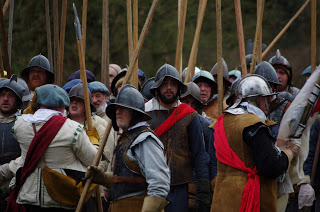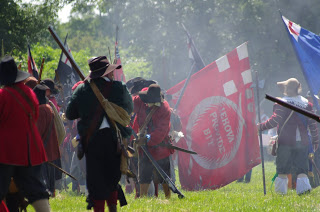Gerrard Winstanley and the True Levellers
In a break from things military, the ECW Travelogue adventures into the radical politics that fermented in the 'World Turned Upside Down' and visited the most famous sites associated with the True Levellers, known as The Diggers, and their leader Gerard Winstanley.
Don't forget that there is a movie about Winstanley and The Diggers, particularly useful if you're suffering from insomnia. (Don't get me wrong, it's a great historical recreation, it's just rather slow.)
Gerrard/Gerard Winstanley (it looks like he may have spelled his name Jerrard) was born in Wigan in 1609, a fact that is celebrated in the self proclaimed nation's pie capital with a memorial garden and an annual music festival - The Wigan Digger's Festival.
Whilst on the subject of music: Winstanley and the Diggers were immortalised in a seventeenth century ballad, which was reprinted and tweaked in the 1800s. More recently Chumbawamba*, and Billy Bragg both recorded it (Bragg's version is called A World Turned Upside Down): both versions can be found over on YouTube.
Aged 21 Gerrard moved to London to become an apprentice cloth merchant, later being admitted as a member of the cloth guild in 1638. He married Susan King in 1639; her father owned property in Cobham, Surrey.
With the outbreak of war the Irish cloth trade collapsed plunging Gerrard into debt and out of business. He and his wife were obliged to move to Cobham, and he was able to support his family as a grazier. This business too collapsed in 1647-8 due to drought and high taxation. It was at this time Gerrard had a spiritual awakening and wrote his books.
In 1649 Gerrard, his family, and a few followers put his theories into practice and occupied land on St George's Hill, proclaiming themselves the True Levellers. Many others would call them the Diggers, a name that they are probably better known by. Other 'digger' communities were established in parts of southern and central England.
So who were the Diggers, and what did they stand for?Most historians would agree that the Diggers were an early proto-communist group with their roots in radical Christianity. Winstanley and the Diggers believed in the abolition of private property rights in favour of the communal ownership of land. They regarded the earth as a "common treasury", taking direct action to put their ideals into practice: to cultivate waste and common land, in the hope that this would begin the process of restoring the land to its rightful owners, the common people, rather than the king, nobility and gentry who had usurped it.
This ECW Travelogue tour centres around Weybridge and the Diggers Trail.
Next stop is St George's Hill, where the Diggers established their first Dig - believed to be on the lower, southern slopes of the Hill, possibly in the region of Camp End Road. Local landowners were, not surprisingly, somewhat hostile and organised gangs to attack and destroy the Digger's houses, crops and livestock. Fairfax visited the Diggers and concluded they were doing no harm. Eventually a court case (at which the Diggers were not allowed to speak in their defence) and further attacks saw the St George's Hill site abandoned and the Diggers moved on to Cobham. In a cruel twist St George's Hill is now home to a gated, protected, extremely expensive residential community and no access is allowed. Close to the believed location of the Diggers site is another information board, located near Silvermere Residential Home on Redhill Road.
Next stop is Cobham where Winstanley's father in law owned property; in yet another cruel twist a mosaic of Gerrard, an advocate of the redistribution of wealth, adorns the side of the former site of Barclays Bank on the pedestrianised section of Hollyhedge Road. There is another information board here too.
In later years Winstanley would become a figure of respectability in Cobham where he held several parish offices during the 1650s and 1660s, including that of churchwarden at St Andrew's Church. A plaque was unveiled in 2009 to commemorate the 400th anniversary of his birth.
Warreners Cottage, The Ridings (opposite number 9 in case you go looking) is believed to be the only property relating to the Diggers still surviving: it was home to Anthony Wren, one of their local supporters. The house is a private residence, so please be respectful and only view from the road. It is probably best viewed in Part 4 of the Diggers films listed below.
After they were evicted from St George's Hill a number of the Diggers established a small community in Little Heath. They cultivated eleven acres and built six houses. As there numbers swelled, the once sympathetic lord of the manor, became increasingly hostile and organised gangs to attack the settlement, ultimately driving them from the land. An information board is located on Littleheath Lane, close to the junction with Links Green Way
Finally (although you may wish to visit this first as it is close to Weybridge Station), St Mary's Church in Walton-on-Thames has strong Digger connections. On two occasions Diggers were arrested and imprisoned in the church.
The church has some other Civil War connections: in April 1649 the church was invaded by soldiers who announced that ministers, magistrates, tithes and the Sabbath were to be abolished.
Master Astrologer William Lilly, author of Merlinus Anglicus Junior, is commemorated by a memorial slab on the floor. It was alleged he had been a ‘double agent’ during the Wars. Lilly would later be accused of starting the Fire of London, having forecast the event 15 years earlier: he would clear his name before a Parliamentary Committee. Coincidentally Lilly has a City of Westminster green plaque next to the entrance to the old Strand Tube Station on The Strand. (Strand Tube Station, if you are wondering which line it is on, is now a ghost station - it is no longer in use.)
For those of you who want to learn a little more about Winstanley and the Diggers, Elmbridge Museum and Royal Holloway University have put together five short films.
Postcodes for SatNavs
Weybridge Station South Car Park KT13 0UNSilvermere Residential Home (ST George's Hill) KT11 1EF


















To be honest I can't think of anywhere less radical in England than Chobham! Interesting slice of history!
ReplyDeleteBest Iain
Thanks Iain. Cobham does seem the least likely place to hold the title 'birthplace of communism'.
Delete